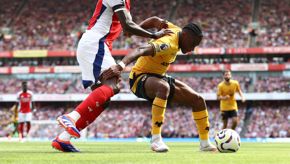To mark the occasion, author and former sports editor for the Express & Star, Steve Gordos, reflects back on the previous time the famous stadium hosted the England senior men’s side.
When Wolves last hosted a full international the visitors were from Denmark – but Molineux was more like “Finney land”.
For veteran England winger Tom Finney was the star of the night as England beat Denmark 5-2 in a World Cup qualifier in December 1956.
The “Flying Plumber” as he was known – he ran a plumbing business – may have been 34, but he still had a fair turn of speed and all the guile and tricks that had made him a football legend.
Billy Wright was the only Wolves man in the England side that night, though the opening international of the 1955/56 had seen Dennis Wilshaw in the team who drew 1-1 against Northern Ireland. That proved to be Wilshaw’s final cap – his 12 appearances having yielded a superb total of 10 goals.
Wilshaw and his fellow inside forward Don Revie were dropped for the next game, against Wales at Wembley, and in came Johnny Haynes of Fulham and – for his first cap – Johnny Brooks of Tottenham. Portsmouth’s left-half Jimmy Dickinson was recalled by the selectors when Duncan Edwards was injured and the Portsmouth man did well as England beat Wales 3-1.
Although Edwards was clearly England’s future and the 31-year-old Dickinson was the past, the selectors kept Dickinson in the number six shirt as Yugoslavia were beaten 3-0 in a friendly at Wembley.
Dickinson again got the vote for the Molineux international, the first at the ground since 1936. However, Haynes had sustained a leg injury and so the selectors were able to name Edwards in the England attack.
As he had often done for his club, Edwards took a change in role in his stride, scoring two goals as England beat Denmark. His Manchester United colleague Tommy Taylor scored the other three.
Finney had played centre-forward in the previous two internationals but was switched to his more usual wing spot. Against Yugoslavia, Taylor had scored two goals when coming on as sub for the injured Haynes.
While the Preston man was on the left another legendary England winger, Stanley Matthews, was on the right. Indeed, it was a team of genuine legends – as well as Matthews, Finney Taylor, Edwards and Wright, there was Manchester United skipper Roger Byrne at left-back.
It was Finney who made the opening goal after just two minutes, boring in from left before giving Taylor a simple task to tap the ball home. Finney soon engineered a similar opening for Edwards, but the resultant shot struck a post.
On 20 minutes, Finney bamboozled the Danes and again Taylor scored though he nearly fluffed it as the ball struck his chest before he controlled it. Centre-forward Ove Nielsen put Denmark back in the game, one shot from him rebounding from a post and another, from a centre by Jorgen Hansen, going in via a post after 28 minutes.
The score stayed at 2-1 until half-time and the sides were then kept waiting. Much to the annoyance of fans, the break lasted nearly 20 minutes due to fitting in with the TV schedule.
Coverage of the second half was on BBC after the Burns and Allen Show. Perhaps George was a little late with his traditional farewell – “Say goodnight, Gracie”. Who said television calling the tune was a modern phenomenon?
When Byrne sent a long through ball down the centre of the field, Taylor outpaced the opposition and completed his hat-trick after 53 minutes. Again, the Danes struck back as Nielsen collected his second after 63 minutes from a pass by a tricky little inside forward Bent Petersen. Within two minutes Edwards thundered in a 20-yard shot for England’s fourth.
Edwards’s power shooting was a feature of the game and after 77 minutes another rocket was deflected home.
It was a clear-cut win, but the Danes were all amateurs in those days and many experts felt England’s score should have been doubled. A typical view came in the Daily Herald where George Follows wrote: “The Danes weaved some pretty patterns but they were paperweight players.”
In the Daily Mirror, Frank McGhee wrote: “Too much superiority made England careless.”
Danish skipper Aag Rou Jensen said afterwards: “Billy Wright stopped us from doing better and the strong shooting of Edwards finished us off when we were tiring under England’s heavy attack.”
Wolves had extra representation in the England camp as the Molineux trainer Joe Gardiner was invited to fulfil that task for the national side.
It’s sad to reflect that four of that England team were destined to die in less than three years’ time – Taylor, Edwards and Byrne victims of the Munich Air disaster and Hall through polio.
The match was Wright’s 81st for England – and there were another 24 to come!
TEAMS
Wednesday 6th December 1956
England: Ditchburn (Tottenham); Hall (Birmingham City), Byrne (Manchester United); Clayton (Blackburn Rovers), Wright (Wolves), Dickinson (Portsmouth); Matthews (Blackpool), Brooks (Tottenham Hotspur), Taylor, Edwards (both Manchester United), Finney (Preston).
Denmark: Drengsgaard (Skovshoved); Larsen (Odense), V Nielsen (AB Copenhagen); F Nielsen (B93 Copenhagen), O Hansen (Esbjerg), Olesen (Aarhus); J Hansen (Naestved), Petersen (Horsens), O Nielsen (AB Copenhagen), Jensen (Aarhus), P Hansen (Esbjerg).
Referee: M Guigue (France).





































